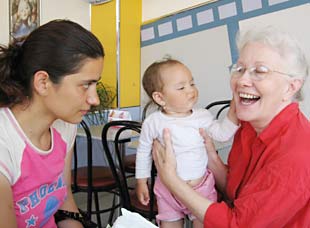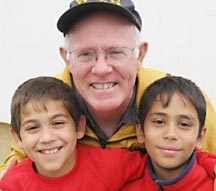UMHB students challenged to see missions up close
Ipdated: 12/01/06
UMHB students challenged to see missions up close
By Jennifer Sicking
University of Mary Hardin-Baylor
BELTON—As Holley Greeson stood in the middle of a crowd of University of Mary Hardin-Baylor students seated on the floor eating chicken curry and rice with their right hands, she spoke about the culture of India—and issued an invitation.
“We hope you’ll come to visit us,” she said.
| Holly Greeson speaks about her experiences as a missionary in India during the Mission Emphasis Fair at the University of Mary Hardin-Baylor. |
That was part of the goal for Greeson and her husband, Kevin, during Mission Emphasis Week at UMHB. The Greesons have spent 13 years in South Asia—India, Bangladesh and Pakistan.
In part, they returned to their alma mater to visit their son, Dennis, who is a freshman at UMHB. But a greater purpose, Kevin Greeson said, was to bring missions into sharper focus for students.
“Out of sight, out of mind,” he said. “Our job is to make sure people are aware of the need and how they can be a part of it.”
With variety of positions and assignments,opportunities abound in the mission field, Greeson said.
“There are jobs out there,” he said. “We’re here to make sure people are aware of opportunities.”
Some of the largest church plants in the world are taking place in South Asia, Greeson said.
“Muslims by the thousands are coming to Christ,” he said. “Hindus—they’re already up to 1 million in one tribe. The way I like to describe it is explosive.”
It thrills him to be a part of leading a person to Christ, but he acknowledged it can get better.
“It’s more of a thrill when that person leads another person to Christ,” he said. “It’s the ultimate thrill when you lead a person to Christ who leads another person who starts a church that starts another church.”
Greeson wants students to know it is possible, and missionaries see it happen. To that end, he has written a book, Camel Training Manual, about how thousands of Muslims are coming to know Christ, available at www.churchplantingmovements.com.
Throughout the Missions Emphasis Week, 32 missionaries interacted with students at meals, spoke in classes and held seminars. Each year, students plan the week-long event, organizing everything from inviting missionaries to scheduling classes for them to attend and places for them to stay.
Shawn Shannon, Baptist Student Ministry director, said there are several goals for the week, which started in 1999.
“One is to awake the campus community to the reality that whoever they really are and what it is they love to do can be used by Jesus to touch the world,” she said. “Sub-goals are that even by this summer, we see some of these step out of culture because of how they love God and people.”
Craig Kendrick, a missionary to West Africans in Paris, said college students often are fearless in sharing the gospel.
Five hundred thousand West Africans live in Paris, Kendrick said, and the largest group is the Soninke, which number about 200,000. Of those, 0.007 percent are evangelical Christians—less than 100 in 1.7 million.
“They’re an unreached people group who have never heard the gospel message,” he said.
One way they have begun taking the gospel to the Soninke and other West Africans is through the Jesus movie. In Paris, they met a member of the Campus Crusade staff who told them he had 8,000 copies of the movie in the main West African languages that he couldn’t distribute. Kendrick told him about their work and accepted the videos to use.
The people, Kendrick said, are very open to Americans, and the movies are useful because many West Africans are illiterate.
Their prayer is to find 12 Soninke men who will attach themselves to Jesus, Kendrick said. So far, he said, God has given them five out of 50,000 to whom they have reached out. When Muslims begin to follow Christ, they can lose their family and cultural identities, and their jobs.
“It’s the first time they have heard of the love of God,” Kendrick said.
He hopes students will come to participate in sharing the gospel.
“God’s got every nation coming to Paris,” he said. “He’s got a work there.”
Erin Rigsby, a 2000 UMHB nursing school graduate, had a goal in returning to her alma mater.
“God changed my life at UMHB,” said Rigsby, now a missionary in Jos, Nigeria. “He made it clear I needed to learn to love people who are different from me. That led to my desire to serve overseas.”
Rigsby hopes to encourage other students “to learn to love those that are unloveable and to learn to embrace the differences in others.”
“I learned while I was here that I was surrounded by people just like me,” she said. “I was comfortable and unchallenged.”
That has changed during the past two and a half years with her ministry in Nigeria, where she works as a nurse caring for orphans and former street children.
Even with its challenges, it’s a life she has embraced.
“I had a plan for my life. My plan pales in comparison to what God has done,” she said.
“I love my life. I can’t wait to get back.”






